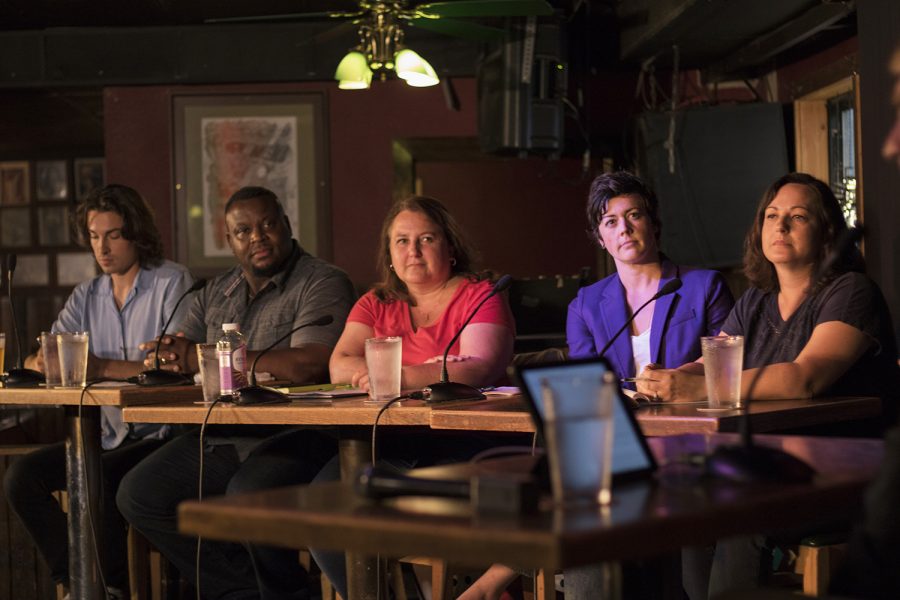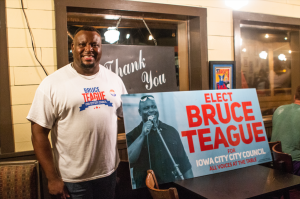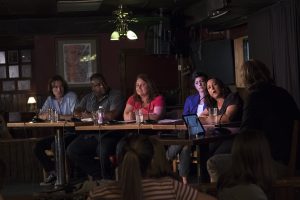Banerjee: City Council primaries are followed by uncertain futures
After the City Council primary elections, the remaining two candidates are an important indicator of what Iowa City is looking for in a leader, but is their rhetoric right for the community?
City Council special election candidates shared their vision for Iowa City at the Mill.
September 10, 2018
On Sept. 4, Ann Freerks and Bruce Teague walked away from the Iowa City City Council primary after securing the top two spots in the five-person race for the single open seat. The two will face each other in the October special election.
Freerks, who has run so far on a city-planning-centric platform, and Teague, who has primarily focused on civil advocacy, are somewhat surprising victors.
Following the special election has been especially useful in understanding the roots of Iowa City politics. In general, the governing principles of the city’s politics can be summed up in three sentences:
Iowa City is a city that prides itself on its perceived progressivism. Iowa City knows very little about how it wishes to achieve its goals. Iowa City responds incredibly well to well-aimed rhetoric.
While all the candidates are passionate and enthusiastic people interested in promoting community well-being, none of them seem particularly equipped in solving any of the issues they raise, least of all Freerks and Teague.
In a very close race, the two primary winners played somewhat antithetical roles: Freerks’ focus on residential neighborhoods and zoning practices differs greatly from Teague’s more overarching goal of establishing a “Human Rights City.” Freerks’ focus left her seemingly unprepared to tackle the vaster problems in Iowa City, problems that lay far beyond her scope in neighborhood associations. And, for Teague, his lofty aim to completely restructure the city during his term as city councilor leaves a large hole in his policy for the important mundanities of the office’s responsibilities.
Rhetoric has played a large role in this election thus far. Rather than providing the voters any concrete plans, the candidates ran on solely ideological standpoints. This worked well in the favor of Freerks and Teague, whose victories can be largely attributed to their careful social positioning. Freerks, with her almost two decades of experience in the public sector coupled with her family-focused narrative, came off as a candidate who would have the people’s best interests in mind. Teague accomplished a similar goal by emphasizing his everyday-man image as a local business owner.
With this flashy rhetoric, however, comes a distinctive lack of substance. Listening to either Freerks or Teague talk is evidence enough of a lack of practical ability. One example of this is Freerks’ reticence toward talking off-script about the issues that should be a second nature to her as a longtime member of the Iowa City Planning and Zoning Commission. Teague, while able to talk eloquently, can rarely provide information beyond his pre-established pitch.
There wasn’t a perfect candidate in this election: the haste of its proceedings led to unprepared candidates with shaky platforms and unfulfilled goals. But, at the same time, I don’t think that Freerks or Teague are necessarily the best for the job, either. Christine Ralston, the director of the UI College of Law career services, and Brianna Wills, the executive director of Old Brick, would have been, in my opinion, better equipped candidates.
Ralston, supported by almost all labor unions in the area, had the power of the people behind her; her academic background could have facilitated the connection between the university and the city as well. Wills, easily the most well-spoken and put-together candidate of the group, had strong, definitive ideas on what she wanted to enact and push. However, her downfall, ultimately, was being the least personable of the group.
In the end, all the candidates could perform the role of city councilor well. The councilor’s responsibilities are not overly complicated and, with the energy demonstrated by both Freerks and Teague, it’s clear they would devote good effort to it. However, I do wonder if Freerks and Teague will be capable of actually putting forth important and worthwhile change while in office. City Council may be a small elected role, but it could potentially be a powerful platform for the types of progress upon which Iowa City prides itself.





